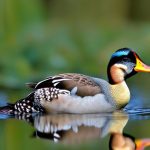Ducks are not only adorable and entertaining animals to have on a farm or in a backyard, but they can also be a great source of fresh eggs. There are many different breeds of ducks, each with their own unique characteristics and egg-laying potential. In this article, we will explore the top 10 duck breeds for egg production, as well as the factors to consider when choosing a breed. We will also discuss the benefits of raising ducks for eggs and provide tips on how to care for them to ensure optimal egg production.
Key Takeaways
- There are many different duck breeds that are suitable for egg production.
- The top 10 duck breeds for egg production include the Khaki Campbell, Indian Runner, and Welsh Harlequin.
- Egg laying potential is an important factor to consider when choosing a duck breed for egg production.
- Other factors to consider include temperament, climate adaptability, and feed requirements.
- Raising ducks for egg production can provide many benefits, including a sustainable source of protein and a fun hobby.
Top 10 Duck Breeds for Egg Production
1. Khaki Campbell: The Khaki Campbell is known for its exceptional egg-laying abilities, with some hens laying up to 300 eggs per year. They are a medium-sized breed with a khaki-colored plumage and a calm temperament.
2. Indian Runner: Indian Runners are slender ducks that stand upright like penguins. They are excellent layers, producing around 200-300 eggs per year. They come in various colors, including white, fawn, and black.
3. Welsh Harlequin: Welsh Harlequins are a beautiful breed with a unique plumage pattern. They are good layers, producing around 250-300 eggs per year. They are also known for their calm and friendly nature.
4. Buff Orpington: Buff Orpington ducks are known for their large size and friendly temperament. They are good layers, producing around 180-220 eggs per year. Their buff-colored plumage adds a touch of warmth to any flock.
5. Cayuga: Cayuga ducks have stunning black feathers that shimmer with shades of green in the sunlight. They are good layers, producing around 100-150 eggs per year. They are also known for their calm and docile nature.
6. Ancona: Ancona ducks have striking black and white speckled plumage. They are good layers, producing around 200-250 eggs per year. They are also known for their active and curious nature.
7. Swedish: Swedish ducks are a medium-sized breed with a blue-gray plumage. They are good layers, producing around 150-200 eggs per year. They are also known for their calm and friendly temperament.
8. Rouen: Rouen ducks are large and have beautiful plumage that resembles that of a Mallard duck. They are good layers, producing around 100-150 eggs per year. They are also known for their calm and gentle nature.
9. Pekin: Pekin ducks are one of the most popular duck breeds for meat production, but they also lay a decent number of eggs. They produce around 100-150 eggs per year. They have a white plumage and a friendly temperament.
10. Muscovy: Muscovy ducks are unique in that they are not actually ducks but rather a separate species. They have a distinctive appearance with red facial skin and black and white plumage. They are good layers, producing around 100-180 eggs per year.
Understanding the Importance of Egg Laying Potential in Ducks
The egg-laying potential of ducks is an important factor to consider when choosing a breed for egg production. Ducks that have a higher egg-laying potential will produce more eggs throughout the year, providing a consistent supply of fresh eggs for your household or business.
Several factors influence the egg-laying potential of ducks, including genetics, age, health, diet, and environmental conditions. Some breeds have been selectively bred for high egg production, while others may have lower egg-laying potential but excel in other areas such as meat production or ornamental value.
It’s important to note that not all ducks within a breed will have the same egg-laying potential. Individual ducks may vary in their ability to lay eggs, so it’s essential to choose healthy and well-cared-for ducks from reputable breeders or hatcheries.
Factors to Consider When Choosing a Duck Breed for Egg Production
When choosing a duck breed for egg production, there are several factors to consider to ensure the success of your endeavor.
1. Climate and environment: Different duck breeds have different temperature and climate requirements. Some breeds are more cold-hardy and can tolerate colder climates, while others may require warmer conditions. Consider the climate and environment in which you live and choose a breed that is well-suited to those conditions.
2. Space requirements: Ducks require ample space to roam and forage. Consider the size of your property and the amount of space you can dedicate to raising ducks. Some breeds may require more space than others, so choose a breed that fits well within your available space.
3. Feed and nutrition: Ducks require a balanced diet to maintain good health and optimal egg production. Consider the availability of feed and the nutritional requirements of the breed you are considering. Some breeds may have specific dietary needs or preferences, so ensure that you can provide them with the appropriate feed.
4. Availability of breeds: Not all duck breeds may be readily available in your area. Research local breeders, hatcheries, or online sources to determine which breeds are accessible to you. It’s also important to consider the availability of ducklings or hatching eggs if you plan on starting with young birds.
The Benefits of Raising Ducks for Egg Production
Raising ducks for egg production offers several benefits that make it an attractive option for many people.
1. Nutritional benefits of duck eggs: Duck eggs are often considered a delicacy due to their rich flavor and nutritional value. They are larger than chicken eggs and have a higher fat content, making them creamier and more flavorful when cooked. Duck eggs also contain more protein, vitamins, and minerals than chicken eggs, making them a nutritious addition to any diet.
2. Sustainable and eco-friendly option: Ducks are efficient foragers and can help control pests in the garden or on the farm. They eat insects, slugs, and snails, reducing the need for chemical pesticides. Ducks also produce less waste than chickens, making them a more environmentally friendly option.
3. Fun and rewarding hobby: Raising ducks can be a fun and rewarding hobby for individuals or families. Ducks are entertaining to watch and interact with, and their antics can provide endless amusement. Additionally, collecting fresh eggs from your own flock can be a satisfying and fulfilling experience.
How to Care for Ducks for Optimal Egg Production

To ensure optimal egg production, it’s important to provide proper care and management for your ducks.
1. Housing and bedding: Ducks require a safe and secure shelter to protect them from predators and the elements. Provide a well-ventilated coop or shed with enough space for the ducks to move around comfortably. Bedding material such as straw or wood shavings should be provided to keep the coop clean and dry.
2. Feeding and watering: Ducks should be provided with a balanced diet that includes a commercial poultry feed formulated specifically for ducks. Supplement their diet with fresh greens, vegetables, and insects for added nutrition. Fresh, clean water should be available at all times, either in a shallow dish or a waterer designed for ducks.
3. Health and hygiene: Regular health checks should be conducted to ensure that your ducks are in good condition. Monitor their weight, behavior, and egg production to detect any signs of illness or stress. Provide regular veterinary care, including vaccinations and deworming if necessary. Keep their living area clean by regularly removing droppings and replacing bedding.
4. Egg collection and storage: Ducks may lay their eggs in various locations within their living area, so it’s important to check for eggs regularly. Collect eggs promptly to prevent them from becoming dirty or damaged. Store eggs in a cool and dry place, preferably in a refrigerator, with the pointed end facing downwards to help maintain freshness.
Comparing Duck Eggs to Chicken Eggs: Nutritional Value and Taste
Duck eggs and chicken eggs have some notable differences in terms of nutritional value and taste.
1. Differences in nutritional value: Duck eggs are larger than chicken eggs and contain more protein, fat, and cholesterol. They also have higher levels of vitamins and minerals such as vitamin B12, vitamin D, iron, and selenium. However, duck eggs also have a higher calorie content than chicken eggs.
2. Taste and cooking differences: Duck eggs have a richer and creamier flavor compared to chicken eggs. The higher fat content gives them a unique taste that many people find delicious. Duck eggs are also known for their excellent baking properties, as they provide a moist and tender texture to baked goods.
3. Why duck eggs are a great addition to any kitchen: Duck eggs can be used in any recipe that calls for chicken eggs, but they can also be enjoyed on their own. Their rich flavor makes them perfect for omelets, quiches, custards, and other savory dishes. They can also be used in baking to create moist cakes, cookies, and pastries.
Tips for Maximizing Egg Production in Duck Breeds
To maximize egg production in duck breeds, there are several tips and strategies you can implement.
1. Providing optimal nutrition: Ducks require a balanced diet to maintain good health and optimal egg production. Ensure that they have access to a high-quality poultry feed formulated specifically for ducks. Supplement their diet with fresh greens, vegetables, and insects to provide additional nutrients.
2. Ensuring proper lighting: Ducks require a certain amount of light each day to stimulate egg production. Provide at least 14-16 hours of light per day to mimic the natural daylight cycle. This can be achieved by using artificial lighting in the coop or by allowing the ducks access to natural sunlight.
3. Managing stress levels: Ducks are sensitive animals and can be easily stressed, which can negatively impact their egg production. Minimize stress by providing a calm and quiet environment, avoiding sudden changes in their routine or living conditions, and ensuring that they have enough space to move around comfortably.
4. Monitoring egg production: Keep track of the number of eggs laid by each duck to identify any changes in egg production. A sudden decrease in egg production may indicate an underlying health issue or stress. Regularly monitor their weight, behavior, and overall condition to detect any potential problems early on.
The Role of Genetics in Duck Egg Production
Genetics play a significant role in the egg-laying potential of ducks. Breeding for optimal egg production involves selecting ducks with desirable traits such as high egg-laying potential, good health, and strong genetics.
When choosing breeding stock, it’s important to select ducks from reputable breeders or hatcheries who prioritize egg production traits. Look for ducks that come from lines with a history of high egg-laying potential and good overall health.
It’s also important to consider genetic diversity when breeding ducks for egg production. Inbreeding can lead to reduced fertility and hatchability, as well as an increased risk of genetic disorders. Introducing new bloodlines periodically can help maintain genetic diversity and improve overall flock health.
Choosing the Best Duck Breed for Your Egg Production Needs
Choosing the best duck breed for your egg production needs requires careful consideration of various factors such as climate, space requirements, feed availability, and personal preferences. Each breed has its own unique characteristics and egg-laying potential, so it’s important to choose a breed that aligns with your specific requirements.
Raising ducks for eggs offers numerous benefits, including the nutritional value of duck eggs, the sustainability of duck farming, and the enjoyment of having ducks as pets. With proper care and management, ducks can provide a consistent supply of fresh eggs while also adding beauty and entertainment to your farm or backyard.
If you’re considering raising ducks for eggs, take the time to research different breeds, consult with experienced duck owners or breeders, and ensure that you have the necessary resources and commitment to provide optimal care for your flock. With the right breed and proper care, you can enjoy the rewards of fresh duck eggs for years to come.
If you’re interested in raising ducks for their eggs, you might also want to check out this informative article on the best duck breeds for eggs. It provides valuable insights into different duck breeds that are known for their exceptional egg-laying abilities. Whether you’re a beginner or an experienced duck keeper, this article will help you make an informed decision when choosing the right breed for your flock. To learn more, click here: Best Duck Breeds for Eggs. And if you’re looking for other helpful resources on chicken coops, be sure to explore these links: Chicken Coop Trampoline, Chicken Coop Portage, and Turning a Shed into a Chicken Coop. Happy reading and happy duck keeping!
FAQs
What are the best duck breeds for egg production?
Some of the best duck breeds for egg production include the Khaki Campbell, Indian Runner, and the Welsh Harlequin.
How many eggs can a duck lay in a year?
On average, a duck can lay between 150-200 eggs per year. However, some breeds can lay up to 300 eggs per year.
What is the size of duck eggs compared to chicken eggs?
Duck eggs are typically larger than chicken eggs. They are about 50% larger in size and have a richer yolk.
What is the nutritional value of duck eggs?
Duck eggs are a good source of protein, vitamins, and minerals. They contain more protein, iron, and vitamin B12 than chicken eggs.
Can duck eggs be used in cooking and baking?
Yes, duck eggs can be used in cooking and baking just like chicken eggs. They are especially good for making custards, cakes, and pastries.
Do all duck breeds lay eggs?
No, not all duck breeds are good for egg production. Some breeds are better suited for meat production or as pets.
What is the lifespan of a duck?
The lifespan of a duck can vary depending on the breed and living conditions. On average, ducks can live up to 10 years.
Meet Walter, the feathered-friend fanatic of Florida! Nestled in the sunshine state, Walter struts through life with his feathered companions, clucking his way to happiness. With a coop that’s fancier than a five-star hotel, he’s the Don Juan of the chicken world. When he’s not teaching his hens to do the cha-cha, you’ll find him in a heated debate with his prized rooster, Sir Clucks-a-Lot. Walter’s poultry passion is no yolk; he’s the sunny-side-up guy you never knew you needed in your flock of friends!







